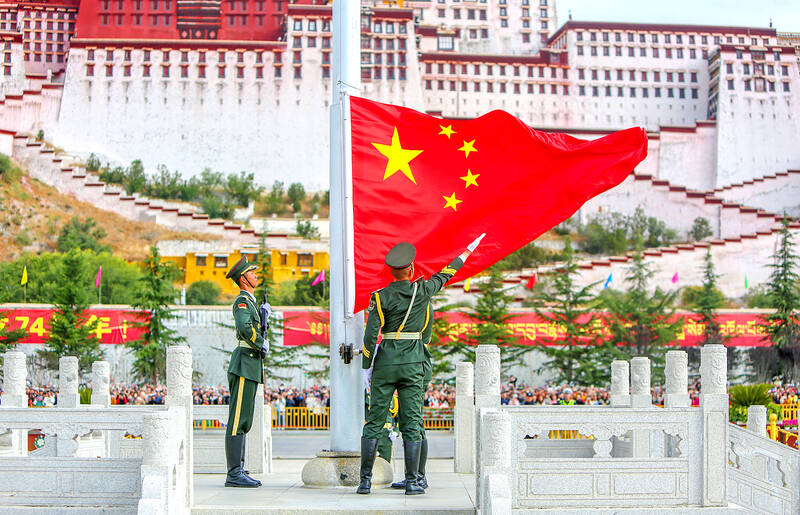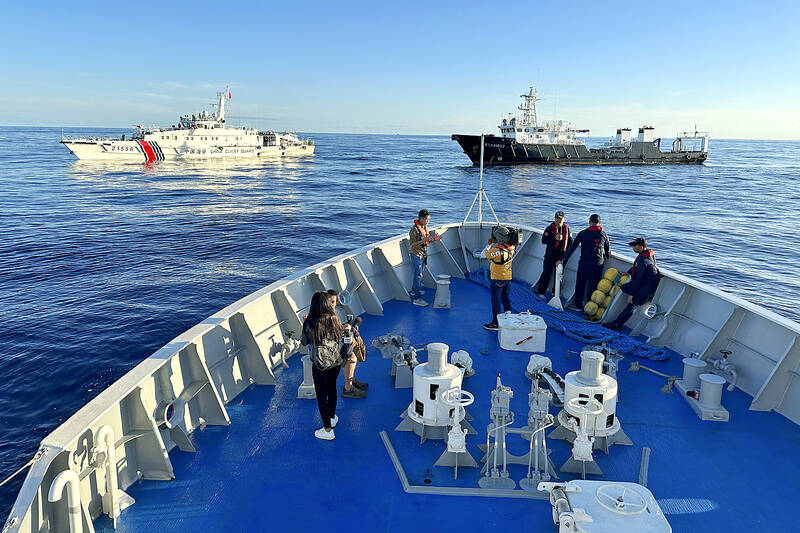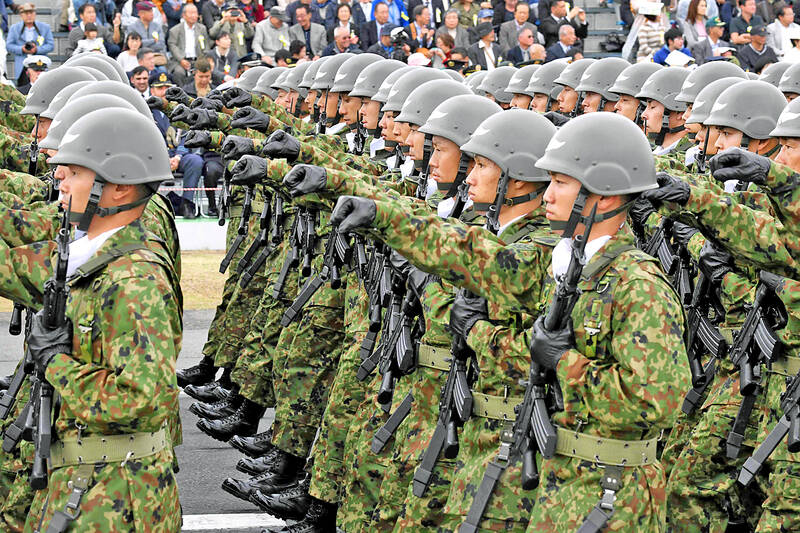In recent months a highly fallacious, deeply ahistorical and ideologically pro-China argument has been put forth in different venues, arguing that the US must provide “assurances” to the People’s Republic of China (PRC) that it does not support “a permanent separation” of Taiwan from China, and that it must return to its rhetorical stance of the 1980s and 1990s.
The latest incarnation of this set of ideas appeared in Foreign Affairs as “Taiwan and the True Sources of Deterrence” (Nov. 30), co-authored by Bonnie Glaser, Jessica Chen Weiss and Thomas Christensen. Echoing ideas they have written elsewhere, they contend that “all sides must recognize that credible assurance is essential for effective deterrence. Credible assurance is not a reward or a carrot. It is a guarantee that a threat is fully conditional on the behavior of its target.”
What should Beijing do? It should dial back its military demonstrations around the island, and change the 2005 “Anti-Secession” law, which codified “its right to use force” (what kind of mind think Beijing has a “right” to attack Taiwan and annex it?) to say that Taiwan will not be invaded unless it opts for “formal independence,” whatever that is. This is the limits of their assurance that Beijing must provide.

Photo: EPA-EFE
WHAT ASSURANCES?
People who write from this alternate reality never ask Beijing to make serious, meaningful changes. The minor moves recommended for Beijing, which few on Taiwan would take seriously, are balanced by a long and detailed list of limits and changes that would take US policy back to the 80s and 90s (before Taiwan was a democracy). It is obvious who they want constrained, and it isn’t the PRC.
If the PRC wants to re-assure Taiwan, it can, on its own, refrain from building up its military. It can’t because Taiwan is only one part of its expansionist dreams, which now include the South China Sea (which, having been taken, must now be held by a naval presence), the Senkakus of Japan (similarly can only be taken by a powerful navy), islands in the Bashi Channel (calls for a powerful navy), along with sundry places in the Himalayan region that are parts of India and other nations.

Photo: AP
In the usual fashion of this style of writing, this context disappears, replaced by a fantasy world in which the future of Taiwan after annexation is not mentioned, never mind all the nations around Taiwan that will be threatened by this unspecified but inevitable future. Tokyo and Manila are not mentioned in the context of Taiwan’s security in the Foreign Affairs piece, a strong signal of a pro-PRC stance. The conflict is instead between only the US, the PRC and Taiwan, a construct that implicitly assigns blame to the US for PRC expansionism. Yet PRC officials have on many occasions threatened the territories of surrounding nations, and annexation of Taiwan will certainly be followed by further war threats (at which point we will have another cycle of history-free recommendations for deterrence that blame the US for PRC expansionism) and later, wars.
In that far-off future when the PRC owns Taiwan, the Taiwanese will suffer greatly, as the peoples of Tibet and East Turkestan suffer now. Nary a mention of that, of course.
The truth is that history has already proven this approach wrong. The list of recommendations they make for the US and Taiwan were dutifully followed by the US from 1980 until around 2008. Three decades of adherence to these policies did not stop the PRC from building up its military and tightening its pressure on Taiwan. The 1990s saw missiles for attacking Taiwan installed and tested in an attempt to intimidate the island’s people during an election. Glaser, Chen Weiss, and Christensen would have us adopt long-failed policies that simply gave the PRC more time to annex the island, and which would further isolate it.

Photo: AFP
Not merely ahistorical, their ideas are absurd. As Michal Thim, a Czech analyst, pointed out on Twitter, the piece posits a world in which the Taiwanese and Americans spend billions on deterring the PRC from attacking Taiwan and then, in the end, hand it over to the PRC. Why on earth would anyone in Taiwan support the waste of billions when they will be delivered to the PRC regardless? Why would Taiwanese youth fight to deter an invasion if in the end they will be handed over to the PRC?
These questions are not merely rhetorical: they point to the logical next step of this argument. I expect this crowd sooner or later to move on to arguing that we should not not bother with deterrence at all since Taiwan is going to be betrayed in the end.
The piece makes a laudable call for the US to clarify its Taiwan policy to the world. Amen. But it does not explicitly mention that under both international law and US policy, Taiwan’s status remains unresolved: it is not part of China. Had any of these writers done so, it would have invalidated their claim that Taiwan is being “permanently separated from China” because Taiwan is not currently part of the PRC. Nor, for that matter, has it ever been part of any Chinese state.
NEW CONSENSUS
The truth is that the US didn’t suddenly change its policy. Slowly — as in any democracy — a new consensus around Taiwan crystallized in response to the PRC’s relentless military build up and savage threats against Taiwan and other US-friendly states. The argument that China needs assurance actually reverses this reality. China is not the actor who is threatened, but the one doing the threatening. It is the potential victims who need assurance: Taiwan, the Philippines, Japan and other nations whose territories the PRC is threatening to violently annex. What assurance would they accept or believe?
Credible assurance, the authors define, “is a guarantee that a threat is fully conditional on the behavior of its target.” The fallacy of this view is that it is the PRC that defines what behavior of the target is acceptable — and it is clear from its behavior for three decades now that Taiwan’s democracy and the needs and dreams of its people are not acceptable, in any form.
Finally, I cannot resist pointing out the very obvious ideological commitments of the piece. The writers state that “[President] Tsai [Ing-wen (蔡英文)] has allowed the teaching of Taiwan’s history separate from the history of China in high schools.” Only a Chinese Nationalist Party (KMT) bitter-ender would insinuate that Tsai is a dictator who exercises personal control over educational policy, and only a bitter-ender would worry that Taiwan’s history is being taught in a Taiwan-centered way. It should be noted that the ideology that centers Taiwan’s history on China is inherently Han supremacist: it ignores the thousands of years of Taiwan prior to the beginning of Han settler colonialism on the island, and defines Taiwan as part of a Han-dominated Chinese state.
Meanwhile, even as I write, the PRC is busy eating away at Bhutan’s territory, constructing villages on border lands it has stolen.
This can only be because Beijing didn’t get the right assurances, right?
Notes from Central Taiwan is a column written by long-term resident Michael Turton, who provides incisive commentary informed by three decades of living in and writing about his adoptive country. The views expressed here are his own.

As Taiwan’s second most populous city, Taichung looms large in the electoral map. Taiwanese political commentators describe it — along with neighboring Changhua County — as Taiwan’s “swing states” (搖擺州), which is a curious direct borrowing from American election terminology. In the early post-Martial Law era, Taichung was referred to as a “desert of democracy” because while the Democratic Progressive Party (DPP) was winning elections in the north and south, Taichung remained staunchly loyal to the Chinese Nationalist Party (KMT). That changed over time, but in both Changhua and Taichung, the DPP still suffers from a “one-term curse,” with the

Jan. 26 to Feb. 1 Nearly 90 years after it was last recorded, the Basay language was taught in a classroom for the first time in September last year. Over the following three months, students learned its sounds along with the customs and folktales of the Ketagalan people, who once spoke it across northern Taiwan. Although each Ketagalan settlement had its own language, Basay functioned as a common trade language. By the late 19th century, it had largely fallen out of daily use as speakers shifted to Hoklo (commonly known as Taiwanese), surviving only in fragments remembered by the elderly. In

William Liu (劉家君) moved to Kaohsiung from Nantou to live with his boyfriend Reg Hong (洪嘉佑). “In Nantou, people do not support gay rights at all and never even talk about it. Living here made me optimistic and made me realize how much I can express myself,” Liu tells the Taipei Times. Hong and his friend Cony Hsieh (謝昀希) are both active in several LGBT groups and organizations in Kaohsiung. They were among the people behind the city’s 16th Pride event in November last year, which gathered over 35,000 people. Along with others, they clearly see Kaohsiung as the nexus of LGBT rights.

In the American west, “it is said, water flows upwards towards money,” wrote Marc Reisner in one of the most compelling books on public policy ever written, Cadillac Desert. As Americans failed to overcome the West’s water scarcity with hard work and private capital, the Federal government came to the rescue. As Reisner describes: “the American West quietly became the first and most durable example of the modern welfare state.” In Taiwan, the money toward which water flows upwards is the high tech industry, particularly the chip powerhouse Taiwan Semiconductor Manufacturing Co (TSMC, 台積電). Typically articles on TSMC’s water demand